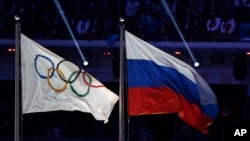The association of National Anti-Doping Organizations (NADOs) on Tuesday called for a blanket ban on Russia from all international sport until the country can demonstrate it has installed and embraced a credible anti-doping system.
Leaders from 19 NADOs held a special summit in Dublin to discuss the fallout from the second part of Richard McLaren's report for the World Anti-Doping Agency (WADA), which last month exposed the huge scale of state-sponsored, systematic doping and cover-ups in Russia.
Following Tuesday's meeting, the organization issued a statement listing a series of desired reforms, and although Russia was not the only nation to spark concerns, the scale of the problem there ensured it dominated the summit's conclusions.
These included the exclusion of Russian sports organizations from all international competition, with a uniform process for athletes to compete as neutrals, until there is substantive progress in reform efforts; the removal of all major international competitions from the country; and a moratorium on the awarding of new competitions to Russia.
NADOs leaders gave their backing to WADA but said the organization needed more support and funding to deal with the unprecedented workload.
"The second part of the McLaren report included an appalling set of evidence exposing a systematic problem that hasn't been fully addressed," NADOs CEO Joseph de Pencier told Reuters in a telephone interview. "There needs to be a sweeping package of reform, and until we have some centralized anti-doping back in Russia, we can't be confident."
'A couple of years'
De Pencier said it would take "maybe a couple of years" for a credible anti-doping system to be put in place but hoped the prospect of Russia potentially missing out on the Pyeongchang Winter Olympics in 13 months' time would instill some urgency.
Travis Tygart, head of the U.S. Anti-Doping Agency (USADA), shared De Pencier's frustration at a lack of visible progress.
"We certainly haven't seen it, and by all public statements they can't even admit that they admitted there was institutional doping happening in their country," Tygart told Reuters.
The New York Times reported last month that Russian Anti-Doping Agency (RUSADA) officials had for the first time admitted there was an organized conspiracy to dope in Russia. It cited Anna Antseliovich, the acting director general of RUSADA, as making the admission in an interview.
However, in response to the article, RUSADA said in a statement that Antseliovich's words had been "distorted" and "taken out of context."
"We want to underline that RUSADA does not have and could not have the authority to admit or deny such a fact [of an institutional conspiracy]," RUSADA said.
Consistent denial asserted
Kremlin spokesman Dmitry Peskov told reporters last month that Russian authorities had always denied the nation was involved in doping.
Russian President Vladimir Putin added that there were some problems with sports doping in Russia, but that there was no state-sponsored doping system as critics had alleged.
Tygart said Tuesday: "We hear the talk and the talk is not very satisfying, but we have certainly seen no action."
He said the NADOs group met in Dublin "to continue to show the importance and urgency of dealing with the worst, almost egregious situation of corruption in international and Olympic sport that the world has ever seen.
"It is easy to forget and allow time to pass and no change happens. This group [NADOs] is committed, as we hear from clean athletes on a daily basis, not to let that happen.
"We have sent a loud message to clean athletes that we are behind them and we are going to stand with them to make sure their rights are protected and get justice for those who were individually robbed.
"We need accountability from the Russian state that perpetuated this fraud and, most importantly, we need reforms to ensure this can never happen again."





![FILE - "By all public statements [the Russians] can't even admit that they admitted there was institutional doping happening in their country," said Travis Tygart, head of the U.S. Anti-Doping Agency.](https://gdb.voanews.com/5F71F70E-D942-4F46-A02A-D9E16591CC17_w250_r0_s.jpg)




